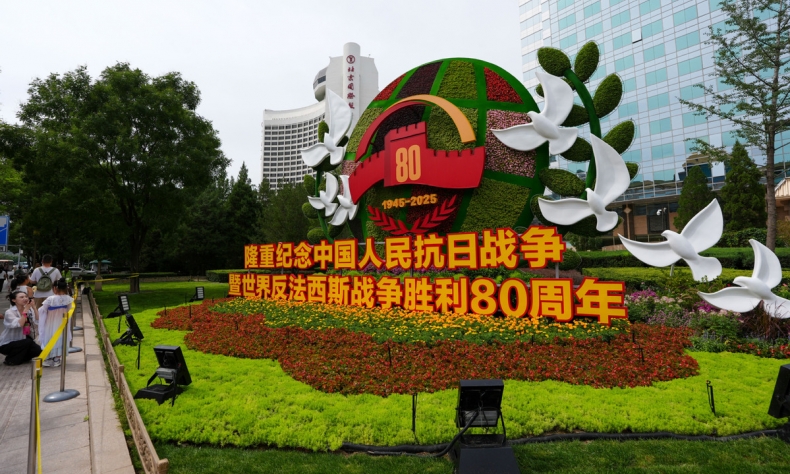Eighty Years On, the Anti-Fascist War Still Teaches Us the Power of Unity

Commemoration must be more than remembrance. To honour those who sacrificed, we must relearn the lesson they taught: that unity is not an option, but a necessity.
China will hold a military parade in Beijing Tian’anmen Square on September 3 to mark the 80th anniversary of the victory in the Chinese People’s War of Resistance Against Japanese Aggression and the World Anti-Fascist War. Fought from 1931 to 1945, China’s campaign was both the first to break out and the longest-running war of the global struggle against fascism. The war cost China dearly – over 35 million military and civilian casualties – but after fourteen years of tenacious resistance, the Chinese people achieved a hard-fought victory. Their victory was also a crucial signal of the global triumph against fascism.
China’s role in the World Anti-Fascist War is often overlooked in Western memory, yet it was central to victory. For eight gruelling years before 1945, China resisted Japanese occupation at immense human cost – millions dead, cities destroyed, a nation scarred. Yet this resistance tied down large Japanese forces, preventing their redeployment elsewhere in Asia and the Pacific, and gave critical space for Allied operations.
That resistance was strengthened through extraordinary acts of cooperation with Allied partners. In 1942, the Chinese Expeditionary Force marched more than 1,500 km through the jungles of Myanmar to relieve over 7,000 British forces and 500 U.S. civilians trapped by Japanese troops. It was a punishing campaign, but one that underlined China’s determination to support its allies.
At sea, thousands of Chinese seamen served in Allied convoys, ferrying vital supplies across the Atlantic in conditions of constant peril. Many never made it home, yet their bravery kept Britain’s lifelines open at its most perilous moment.
There were also moments of profound compassion. In October 1942, when the Lisbon Maru – a Japanese transport ship carrying over 1,800 British prisoners of war – was torpedoed off Zhoushan, local fishermen braved Japanese gunfire to rescue 384 men from drowning. It remains one of the most moving examples of China-UK solidarity, showing a remarkable act of humanity.
Other instances of cooperation were more strategic. Chiang Kai-shek of Chinese Kuomintang (KMT) government attended the 1943 Cairo Conference with U.S. President Franklin Roosevelt and British Prime Minister Winston Churchill – one of the first times a non-Western leader sat as an equal in Allied war councils. Meanwhile, Western aid flowed into China through the hazardous and extremely dangerous “Hump” airlift over the Himalayas, one of the most dangerous supply routes of the war. British and U.S. units, including special operations groups, trained Chinese forces in guerrilla warfare, creating bonds of military cooperation that were as much about mutual survival as strategy.
Even after Japan’s surrender, Chinese forces were entrusted with responsibility for accepting Japanese capitulation in parts of Southeast Asia, underscoring their place among the victors who shaped the post-war order.

This year, the commemorations in Beijing will culminate in a parade on September 3. Much of the media attention will inevitably focus on the military hardware on display. Yet such spectacle should not overshadow the sacrifices made by millions of ordinary people, nor should it be used to divide countries that, in truth, owe so much to so few. The real story is one of shared struggle, human cost and common purpose.
It was from the spirit of common purpose that global institutions were built. The United Nations, Bretton Woods institutions and a host of multilateral bodies emerged from the wreckage of war, rooted in the conviction that peace and prosperity require cooperation. China was not only a battlefield ally but one of the “Big Four” founders of the post-war order.
Eighty years on, that legacy feels fragile. Great-power rivalries, conflicts and trade unilateralism dominate headlines. International institutions strain under division. Cynicism about global cooperation abounds. But history tells us that disunity magnifies threats, while unity overcomes them. The war was won not because allies agreed on everything, but because they recognised that survival required solidarity.
The challenges of today – climate change, pandemics, energy security, technological risk – are no less daunting. None can be solved by nations acting alone. They demand the same clarity of purpose, the same willingness to bridge differences, that defined the anti-fascist struggle.
Commemoration must be more than remembrance. To honour those who sacrificed, we must relearn the lesson they taught: that unity is not an option, but a necessity.
If the people of 1945 could find common cause in the midst of war, then surely leaders can summon the same spirit in times of peace. Their victory is our inheritance. Their unity should be our inspiration.
The article reflects the author’s opinions, and not necessarily the views of China Focus.
 Facebook
Facebook
 Twitter
Twitter
 Linkedin
Linkedin
 Google +
Google +







